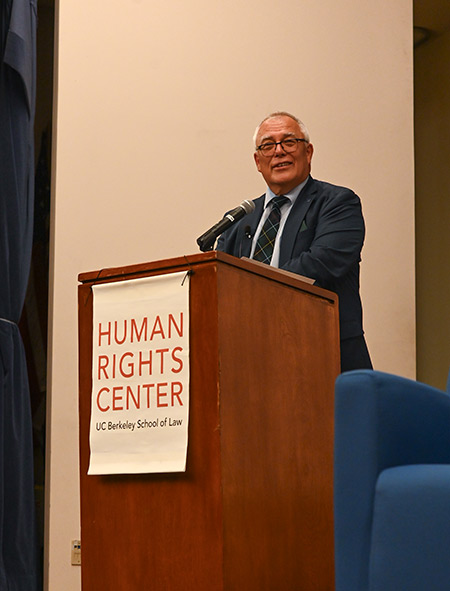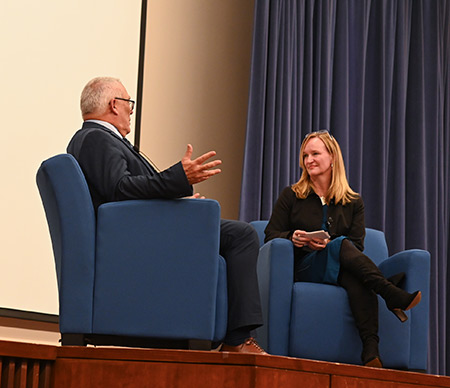By Andrew Cohen

International Criminal Court (ICC) President Piotr Hofmański has no delusions about current threats to democracy and the rule of law worldwide. Still, his recent talk at Berkeley Law revealed optimism about the road ahead and the court’s role in safeguarding fundamental rights.
His opening remarks and conversation with Human Rights Center Co-Faculty Director Alexa Koenig Ph.D. ’13 stressed the ICC’s value as a permanent judicial institution designed to fight impunity for genocide, crimes against humanity, war crimes, and the crime of aggression.
“Today, 123 states have joined the court,” said Hofmański, who was named to the court in 2015 and elected president in 2021. “That’s two-thirds of the states in the world. It’s great, but still not enough. This is the step every democratic country that values peace, security, and human rights should undertake.”
A longtime judge and professor in his native Poland, Hofmański has authored more than 300 books, commentaries, and articles on criminal law, criminal procedure, international cooperation in criminal matters, and human rights protection. During his Bay Area visit, he gave a keynote speech at the San Francisco Fleet Week Senior Leaders Seminar and met with Berkeley Law faculty and students in addition to the open event co-sponsored by the Human Rights Center and the Miller Institute for Global Challenges and the Law.
Addressing contemporary challenges to international criminal law, the relationship between the ICC and the United States, and threats to global human rights, Hofmański highlighted the court’s unprecedented focus on victims through reparation programs, including physical rehabilitation and trauma counseling. He urged U.S. decisionmakers to seriously consider joining the ICC to help strengthen the international community’s collective efforts for accountability and the prevention of future atrocities.
Hurdles and hopes
Koenig, co-chair of the ICC’s technology advisory board and an expert on international criminal law and the intersection of technology and human rights, asked Hofmański about the ICC’s main challenges. Located in The Hague, Netherlands, the court investigates and sometimes tries people charged with the gravest crimes of concern to the international community.
“The most important challenge is to ensure the court is able to continue independently,” he said. “There are continual attempts to distort our work and undermine our independence. But we’re resilient and determined to do our job despite these challenges”.

“It’s really important that after 21 years we still exist. Sometimes we’re criticized for the [relatively small] number of cases that come before the court, but you have to keep in mind how huge many of these cases are. If there’s a case with 300,000 victims, there are hundreds of witnesses to be heard and it can take three years in the courtroom.
“We’re a complementary court, the court of last resort. Eighteen judges can’t deal with all atrocities from around the world. Our job is to step in only when victims cannot expect to receive justice from their national jurisdictions.”
Introducing Hofmański, Human Rights Center Co-Faculty Director Eric Stover noted that the center has worked with the court on establishing secure ways of handling witnesses and on developing best practices for incorporating evidence from open source investigations of atrocities online.
Armenia is currently going through the process of becoming the 124th member state of the ICC. Unlike tribunals established in Tokyo, Nuremberg, and elsewhere after World War II, Hofmański said the ICC is victim-centered. In those other tribunals, he explained, victims were sometimes witnesses but did not otherwise participate in the proceedings.
“That changed with the creation of ICC,” he said. “It combined retributive justice with reparative justice.”
Leading the way
The ICC elects its president through a vote by the member judges, which Hofmański said makes his position especially meaningful.
“I value this role so much because my colleagues believe in me,” he said. “I also wear two hats, that of president of the court but also still as a judge. I’m not a politician, but I’ve become a politician a bit because of conversations with state actors and working to attract more states to the court.”
Lamenting that the budget for the ICC’s prosecution budget is similar to the budget of the Berkeley Police Department, Koenig said the court faces an uphill battle without sufficient resources. Governments and private entities can make donations to the ICC’s Trust Fund for Victims, but investigations and trials are funded from the court’s general budget, which is approved by and funded by its member states.
After his conversation with Koenig, Hofmański fielded questions from students on topics including human rights violations in Sudan and China as well the future of incorporating evidence derived from videos on social media.
In 2017, the ICC was the first court to approve the use of such evidence, and the first to issue a warrant of arrest based on it. The Berkeley Protocol on Digital Open Source Investigations, developed by the Human Rights Center, has become a model for countries to advance such evidence.
“We need every state that values the rule of law, peace, security, human rights, and democracy,” Hofmański said. “We basically intervene only in situations where it’s completely not possible otherwise, where the judiciary system is destroyed, for example … Our role is to encourage states to pursue justice there, but when that can’t happen we exist to close the gap of impunity.”